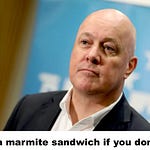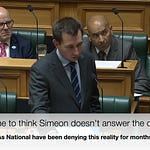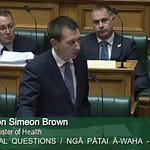Over the weekend, I found myself rather irritably reading up about the Treaty of Waitangi.
“Do I need to do this?” It’s not my jurisdiction. In any other world, would this be something I choose to do?
My answer - no.
The Waitangi Tribunal, headed by some of our best legal minds, and with access to NZ’s astute experts, translators, lawyers, historians, and academics, has it in hand.
Except last week in Parliament (28/08/24), I heard our Deputy Prime Minister, Winston Peters , criticize legal work around Te Tiriti as “..fiction made up of modern jurisprudential activism.”
As Acting Prime Minister, Peters made it clear that he thought the Treaty Principles had not been correctly represented by “woke media or, dare I say it, woke academia and by younger Māori.”
In case it isn’t clear, “woke”, means “alert to and concerned about social injustice and discrimination,” but is an insult when employed by the likes of Seymour, Peters and co.
Peters also seemed to imagine that his older age infers superiority, yet he consistently can’t even get facts right.
His answers in the House - responding to patient and respectful questioning from Te Pati Maori’s Debbie Ngarewa-Packer - was marked with condescension.
And on it went. One of the exchanges was -
Ngarewa-Packer: “If he cannot determine on what grounds Māori ceded sovereignty to the Crown, what gives the Crown the right to overrule the courts to entrench the confiscation of 95 percent of our coastlines as admitted by his Minister of Justice?”
Peters does not answer the question directly but invokes Dame Whina Cooper, and ends with “When (the land march) was over, she said, ‘We signed the Treaty so that we could become one people.’ I'm listening to her.”
Interesting that Peters invokes Dame Whina Cooper.1
He then misquotes her and mis-contextualises her statement.
His twisting of words though is significant. More on that later.
What Dame Cooper actually said in 1990 to an international audience at the opening of the Commonwealth Games was:
“Let us all remember that the Treaty was signed so that we could all live as one nation in Aotearoa”.
In effect, Peters leveraged the name and life of a woman who fought and worked courageously for Māori, their rights, and dignity. Yet this government aims to undo decades of reconciliation and hard won Māori rights, championed by the very likes of Dame Cooper.
Does he not have shame?
Luxon’s Tears
It reminded me of Luxon’s ‘tears’ at the Māori King’s passing.
After Luxon’s “emotional” tribute to Kīngi Tuheitia at the funeral, he cheerfully told media it’s important that Māori not “lose sight of the goal” of making NZ better - nor to be “disagreeable” if Māori disagree with his government’s anti-Māori policies. And very quickly, Luxon pivoted to where he is most comfortable - self-promotion.
Yes, if I steal, insult, harm, ignore, disrespect or gaslight you, as long as I do it with nice words and platitudes I am the superior person.
Right, Luxon?
Beg to differ.
For Luxon, who is a devout Christian, Matthew 7:15-20 may be of interest
“By their fruits, shall it be known. Their appearance and their claims are no proof of their true character.” - Jesus
The hypocrisy is compelling but not moreso than his bed-fellows.
Back to Peters.
Dame Cooper said - “Let us all remember that the Treaty was signed so that we could all live as one nation in Aotearoa”.
But Peters claimed she said - “We signed the Treaty so that we could become one people.”
(Emphasis mine)
This is of significance because this “one people” claim is the entire basis of the far right group, Taxpayers Union affiliated, Hobsons Pledge. Their icon:
And website with the relevant quote:
Contriving Problems To Force Their Way
Yes -
The entire thesis - from Seymour to Brash down to Peters and Luxon - is that rolling back Māori rights, support and dignity, is really about making “all New Zealanders equal”.
The Hobsons claim is disputed2 but more importantly, as right wing strategist Matthew Hooton notes in the video above, why are we focusing on alleged words that aren’t even written down when the Treaty is the real place of contract law and written evidence?
Do the libertarians not support contracts anymore?
My opening point remains, however - this shouldn’t be something that any of us on the street or even in Parliament should be debating when the actual qualified experts are already doing the work - and have done so for decades.
Yet in the last week, we’ve seen just that - Luxon, Peters, Hipkins, all weighing in on who ceded sovereignty - all in response to the contrived problem that David Seymour and Hobsons Pledge have crafted.
People have had to step in and step up because Seymour, Brash, Peters et.al have a specific strategy to side line experts - yes, expertise & knowledge always a threat to populists, since 1871! (I made up the year, but not the tactic)
Chris Hipkins:
“We also have to acknowledge that sovereignty, while not ceded, was taken by the crown. Part of the treaty settlements process has been addressing, it’s been recognising that by force in many cases the crown asserted sovereignty and took sovereignty,”
And while it’s important, and I see why Hipkins, Swarbrick and Ngarewa-Packer have been forced to step in, this contrived need is on the shoulders of Luxon and his band of cohorts.
Did you know? The entire sum of all historical land settlements to Māori - over ~30 years - is less than $3bn. That’s about 2 months worth of Superannuation payments
We have serious issues to address - a failing health system, the deteriorating economy under an austerity government3, a lack of sustained infrastructure4, low productivity levels, crime, cost of living, climate change (big one), increasing poverty etc.
But as I wrote in April and republished on Substack, David Seymour’s primary mission appears to be about undoing Māori rights because Te Tiriti consistently stands in the way of commercial, “free market” interests - especially large fossil fuel mining interests.
Atlas anyone? They have been running this anti-indigenous theme for years and have won those battles in Canada and Australia. Talk about success and experience!
Here, National are allowing an extraordinary 6 month Select Committee process for the Treaty Principles Bill for maximum exposure and damage, and everyone - including Winston Peters and David Seymour - knows that Luxon will flip on the Treaty Referendum at the drop of a hat if he thinks there will be political gains to be had.
In a battle plan, it’d very much be about siphoning us all into a select corridor to activate their well planned and resourced up attack plan. Combined with forced Māori ward voting, 2025 could be very unpleasant, unless something drastically changes.
Let’s start to close with a few facts, shall we?
The entire sum of all historical land settlements to Māori - over ~30 years - is less than $3bn. That’s about 2 months5 worth of Superannuation payments, or even less than what Luxon and co gave back to landlords in tax breaks. Yet some will act like we are being robbed blind by successive settlements or that Māori are somehow responsible for declining standards.
Under the New Zealand Settlements Act 1863, the Crown confiscated at least 1.3 million hectares of Māori land.
Through successive acts of the NZ Government, Māori went from owning nearly all of the land in Aotearoa to only 8% in 1920.
Around the time of signing the Treaty, there were around 125,000 Māori and about 2000 settlers
This is the English translation of the Treaty and this is it in Te Reo Māori. There are key ambiguous terms including “kawanatanga” which experts agree would not have connotations of sovereignty to Māori when they signed in Te Reo Māori.
I personally think Hipkins had it right, and it was the primary view of successive NZ governments.
Indeed, the Waitangi Tribunal already reached that conclusion in 2014.
Irrespective - due to the possibility of argument - to move forward as a country, co-operation and mutual respect is critical. If anything, it’s good politics and good for the nation to help each other succeed, and to be honest about past wrongs, rather than gaslight victims into acquiescence.
Matthew Hootton mentioned the words “white supremacy” in the video above. And it’s something that I think about too. White supremacy has as its seed a fear of inferiority and needing a scapegoat for their own insecurities and lack. But it’s also an imperialist viewpoint, based on a belief that the European culture and belief system is the superior one - something Paul Goldsmith seems to demonstrate when he claims that Maori primarily benefited from colonialism, whitewashing their pain as “it was always going to be traumatic.”
Similarly, I’ve noted any allegations of corruption or wealth in Māori circles are often attacked as negative, undeserving or suspicious, whereas those same people will celebrate the wealth of figures like Donald Trump, Elon Musk, or Alan Gibbs as “smart” and “well deserved”.
What gives?
They have co-opted words as part of their strategy
Racism has negative connotations. It is holding prejudices, discriminating and acting against a race that unduly harms and impacts them.
Reparations or supporting vulnerable communities / persons - based on race - is not racism.
Racism contains negative motivations.
Let’s look at some parallel examples:
If at school, there is a high needs child, my support of them is not negative discrimination against others - even if I have to spend a little less time with other children.
If in a hospital setting, female requires special service or female-only wards, I am not being sexist towards men by allocating budget for the women.
If certain cancers cost more to fund than others, I am not being unjudicious towards other cancer patients, by allocating more towards these.
If I have forcibly taken from a person and their descendants lost the chance for generational wealth and genuine equality, me giving them 1% of their land value back, isn’t even kindness, but it’s the very least I could do.
Not only that - as I said above - it’s smart politics and good for my country.
The word “racism” has been co-opted by the nefarious actors on the right, who now suggest that differentiation and discernment equals racism.
No. Context matters, and as humans it’s always important we differentiate and discern.
I’ve also heard the argument “well if we are going to have policies for Māori, what about Indians and Philipine folk?”
And I’d suggest differentiation would show us that Māori were specifically and systematically harmed by the NZ Government and others did not have that history. It’s the same reason the US provided reparations for American Japanese who were incarcerated unfairly and painfully.
The Māori Health Authority - which aimed to close systemic gaps in our system and was advocated for by doctors and specialists - would provide a more holistic way to educate, support, intervene and again unburden the health system and social costs - that ultimately costs more. How much did it cost? Well less than 1% of our total health budget and possibly even less than 0.5%.
It’s not rocket science - none of this is - but mostly the conversations are hijacked with sensationalism and convoluted logic.
It’s going to be high time that people call out Seymour and his cohorts for their sleazy tactics.
Which is why this week we have to all say “Thanks for telling it like it is, Matthew”.
Did you know? Another culture war topic is roads: Speed bumps in Auckland cost on average only $19,000 - $31,000 and cycleways account for a mere 1% of the transport budgets. Likewise the Maori Health Authority was allocated 0.02% of the health budget yet was positioned by the right and newsrooms as taking away from New Zealanders.

















